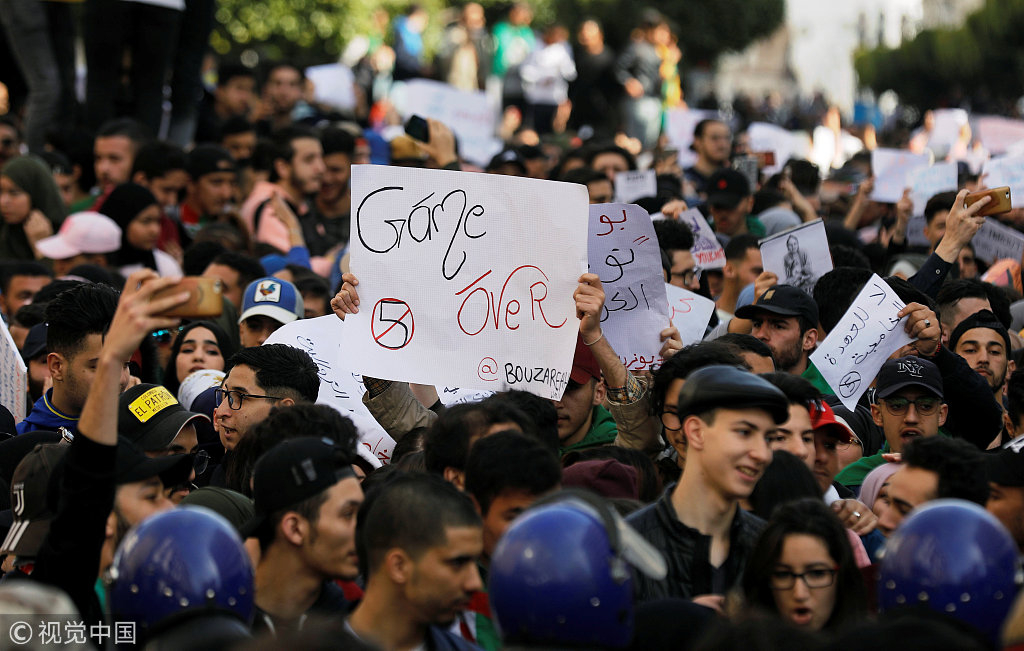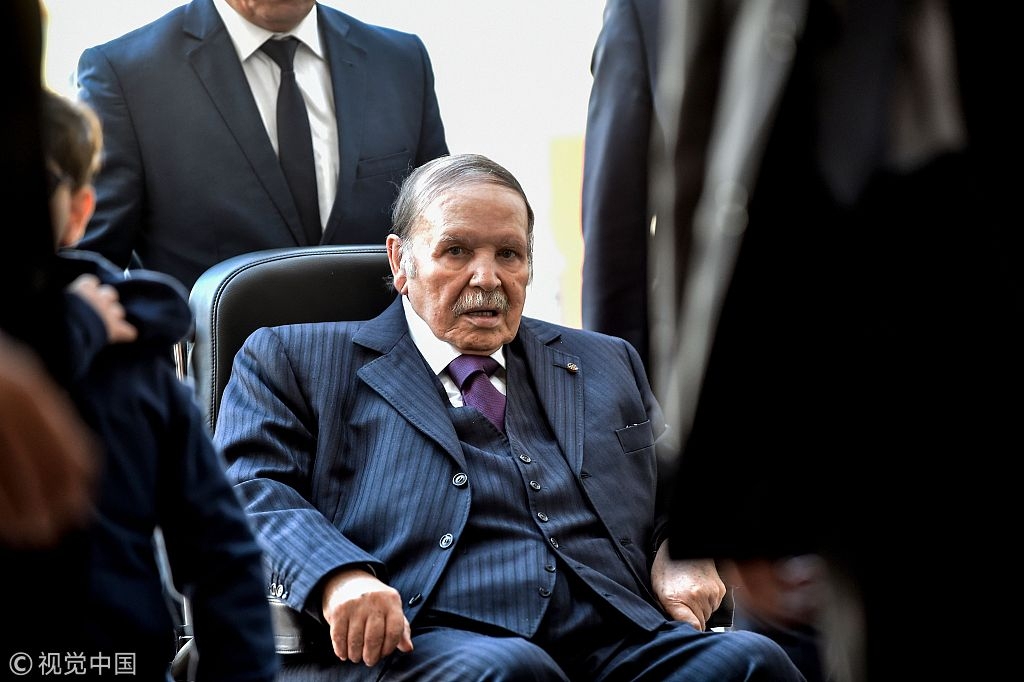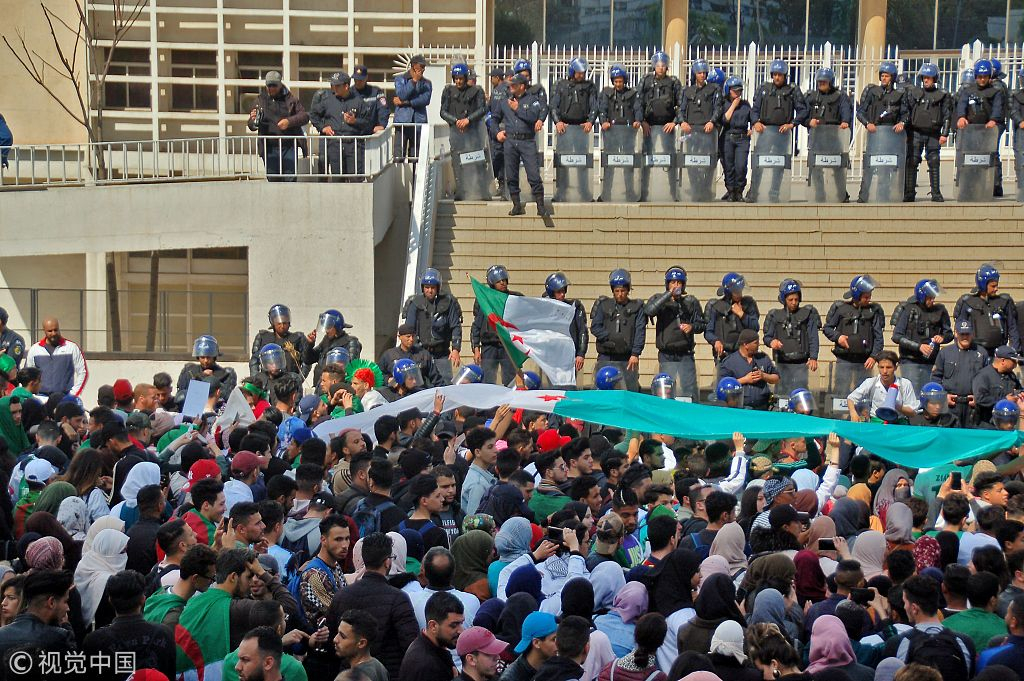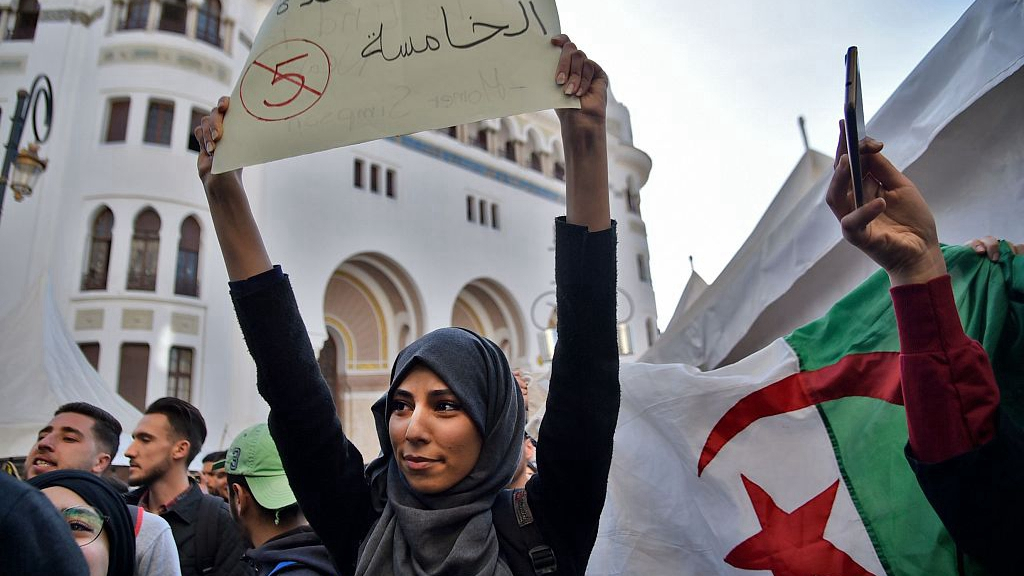If the hundreds of thousands of Algerians who march on the streets these past days had just one message for their country, it would be to let go of the past and move on. Long-term President Abdelaziz Bouteflika shall resign, they say.
With presidential elections due on April 18,
Xinhua has reported that Algeria is witnessing widespread protests for the incumbent president not to seek a fifth term.
The mass demonstrations are considered the most significant since Bouteflika came to power 20 years ago, according to a recent
BBC report, and they already seem to be having an impact. Upon his submission of candidature for a fifth term, Bouteflika promised to step down if he wins the election after the first year.
On Tuesday, after new student protests, Algerian Army Chief of Staff and Deputy Defense Minister Ahmed Gaid Salah pledged to guarantee the country's security, while demonstrators are already planning their next Friday march.

Students take part in a protest to denounce an offer by President Abdelaziz Bouteflika to run in elections next month but not to serve a full term if re-elected, in Algiers, March 5, 2019. /VCG Photo
Students take part in a protest to denounce an offer by President Abdelaziz Bouteflika to run in elections next month but not to serve a full term if re-elected, in Algiers, March 5, 2019. /VCG Photo
Country of the young
CGTN spoke to a young protester in Algeria's northwest city of Tlemcen, also named the "city of power" as it is the native city of Bouteflika and many of his ministers.
"There's no advantage from being born in Tlemcen. We have the same problems here as all the other Algerians," Abdelhak Benikhlef, 30, said.
A telecommunications engineer, Benikhlef belongs to those who are fortunate enough to have a job, even though he has to commute 150 km to work daily and could only recently afford to rent an apartment for his wife and two-year-old son.
In his country, the below-30s make up for more than two-thirds of the population of 41 million. Among people of the same age, the unemployment rate is higher than the national average of 11.1 percent (April 2018), with 26.4 percent for Algerians below the age of 24. The crisis in the real estate sector is taking an additional toll on them.
Speaking up
"We want a president who speaks, who moves, who travels, who leads the country," Benikhlef said. More deeply, he has joined the street rallies to express his wish for a new Algeria that prospers economically and takes a more important role internationally, something the current system has failed to achieve. Similar to many of his fellow protesters, he does not feel represented by an invisible, ailing president and a "political-financial mafia who governs the country like a corrupt oligarchy."

Algerian President Abdelaziz Bouteflika during one of his rare public appearances, heading to vote at the local elections in Algiers on November 23, 2017. /VCG Photo
Algerian President Abdelaziz Bouteflika during one of his rare public appearances, heading to vote at the local elections in Algiers on November 23, 2017. /VCG Photo
Abdelaziz Bouteflika, elected president in 1999, made his last public appearance in 2018. Aged 82, he suffered from a stroke in 2013, which has made walking and talking difficult for him. Hospitalized in Geneva, Switzerland, since February 28, undergoing medical checks, his campaign manager submitted the candidacy for a fifth term on Sunday amid ongoing protests.
The promise of a shortened term fell short of satisfying the protesters, who still wait for him to keep his word from the 2012 elections to "leave the power to the younger generation."
Through the demonstrations, which Benikhlef calls an "intellectual" movement joined by students, academics, business people, old and young people of all genders alike, Algerians have found a way to make their voices heard.
Lack of alternatives
Recent signs point to a government that might implement repressive measures in case the protests escalate. During a TV address on Tuesday, Army Chief Ahmed Gaid Salah vowed to guarantee the country's security and stability. However, the organizers are already calling for another Friday march on social media.
"There are talks of civil disobedience," Benikhlef said. However, until now, the upheaval has remained peaceful and non-violent, with pacifism and civilized behavior being the overarching theme. The protesters are wary not to repeat the mistakes of similar protests in Arab countries or during the Arab Spring, the reason why Benikhlef believes that the "system" has understood that it was time for a change.

Algerians demonstrate in the northern coastal city of Oran, on March 5, 2019 against their ailing president's bid for a fifth term. /VCG Photo
Algerians demonstrate in the northern coastal city of Oran, on March 5, 2019 against their ailing president's bid for a fifth term. /VCG Photo
Experts, on the other hand, think that Bouteflika's reelection is inevitable, despite the unrest. Veteran correspondent Gu Zhenglong, who covered North Africa and the Middle East for Xinhua News Agency for almost two decades and who now works as a researcher at the World Studies Center at Xinhua, points to the achievements of Bouteflika during his four terms in establishing relative stability for Algeria, for which he had earned much respect in the Arab world.
However, the president's deteriorating health has plunged the country into a political crisis.
"The problem is that there is no real alternative to Bouteflika," Gu said. With the country's elite being unclear about a suitable successor and the two main opposition parties to Bouteflika's National Liberation Front (NLF) – the Labour Party and the Islamist Movement of Society for Peace – boycotting the elections, there is a vacuum that will be difficult to fill with the 19 other, lesser-known candidates who have submitted their papers for presidency.
No end in sight
Algeria's stability is of interest to the international community, as it is a strategic partner to China and the U.S. as well as a major gas supplier to Europe.
The current political crisis only adds complications to the domestic and external issues Algeria has to deal with. The 2018 report from Transparency International, an independent anti-corruption coalition, shows that corruption is an ongoing issue in Algeria, ranking it 105 out of 180, up from 112 in 2017. Gu added that other issues include slow economic growth and diversification, the threat of ISIS in the region and remaining political instability since the Arab Spring.
"These are difficult times for Algeria," Gu said. "As long as the country's numerous problems remain unresolved, the anti-government protests will continue."

Algerian protesters dismissed President Abdelaziz Bouteflika's promise to quit early if re-elected for a fifth time in April and eyed fresh protests. /VCG Photo
Algerian protesters dismissed President Abdelaziz Bouteflika's promise to quit early if re-elected for a fifth time in April and eyed fresh protests. /VCG Photo






